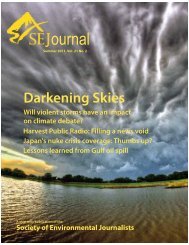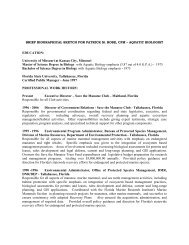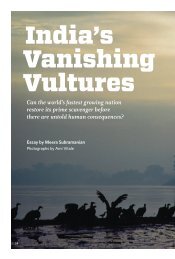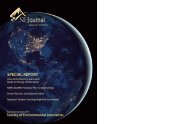PDF Download - Society of Environmental Journalists
PDF Download - Society of Environmental Journalists
PDF Download - Society of Environmental Journalists
Create successful ePaper yourself
Turn your PDF publications into a flip-book with our unique Google optimized e-Paper software.
SEJ President’s Report<br />
SEJ promotes science-journalism connection,<br />
alters funding policy to build more stable organization<br />
By CAROLYN WHETZEL<br />
SEJ ushered in 2011 with an event at the University <strong>of</strong><br />
California, Santa Barbara that explored the communication<br />
challenges journalists and scientists face.<br />
SEJ’s Board <strong>of</strong> Directors, other SEJ members, and scientists<br />
at UCSB’s Bren School <strong>of</strong> <strong>Environmental</strong> Science and Management<br />
participated in the Jan. 28 roundtable discussion which<br />
focused on how to meld the different worlds in which journalists<br />
and scientists work toward a shared goal <strong>of</strong> advancing public<br />
understanding <strong>of</strong> environmental issues.<br />
Scientists voiced their concerns about being misquoted or<br />
having their comments or research misinterpreted, which is why<br />
they <strong>of</strong>ten ask to approve quotes, or sometimes an entire story. The<br />
scientists also sought advice on how to cultivate relationships<br />
with journalists to promote research they believe is getting too<br />
little attention.<br />
<strong>Journalists</strong> stressed their need for trusted science sources and<br />
information and for quick responses when writing on deadline. The<br />
journalists urged the scientists to reach out to reporters, clearly<br />
explain their research, and let journalists know when there are<br />
errors in their reporting.<br />
Bringing journalists and scientists together is nothing new for<br />
SEJ. We’ve been doing it for years at annual and regional<br />
conferences and for reporting tours to help journalists explore the<br />
work scientists are doing.<br />
SEJ would like to expand its effort to build better relationships<br />
between journalists and scientists, possibly by convening similar<br />
discussions in public venues or at scientific meetings. Events could<br />
focus on coverage <strong>of</strong> specific news topics, like climate change or<br />
other hot-button environmental issues. SEJ could link these efforts<br />
with more <strong>of</strong> our famous reporting tours or visits to laboratories or<br />
field work sites to explore cutting edge research or under-reported<br />
news stories.<br />
Many thanks to UCSB faculty and others for hosting the<br />
roundtable discussion and the evening event which featured the<br />
showing <strong>of</strong> Frontline and ProPublica’s “The Spill,’’ followed by a<br />
lively panel discussion with journalists, including ProPublica’s<br />
Abrahm Lustgarten and Los Angeles Times reporter Bettina<br />
Boxall, and scientists.<br />
UCSB <strong>Environmental</strong> Studies Pr<strong>of</strong>essor Bill Freudenburg, an<br />
SEJ member, was to be part <strong>of</strong> the panel to discuss his recent book,<br />
Blowout in the Gulf: The BP Oil Spill Disaster and the Future <strong>of</strong><br />
Energy in America. Sadly, Bill succumbed to cancer in late<br />
December (see page 5 in this journal for a remembrance <strong>of</strong> Bill<br />
and his final words to us!) As part <strong>of</strong> a moving tribute to Bill, his<br />
co-author Robert Gramling, pr<strong>of</strong>essor <strong>of</strong> sociology at the<br />
University <strong>of</strong> Louisiana, Lafayette, served on the panel.<br />
Ultimately the SEJ board was gathered in Santa Barbara to<br />
tackle its first business meeting <strong>of</strong> 2011, the budget meeting.<br />
After approving a FY 2011 budget <strong>of</strong> $918,500, SEJ’s Board<br />
4 SEJournal Spring 2011<br />
<strong>of</strong> Directors voted Jan 29 to revise the organization’s financial<br />
policies to allow limited gifts <strong>of</strong> unrestricted general support from<br />
anyone who supports SEJ’s mission.<br />
The revised policy changes the SEJ board’s longstanding<br />
prohibition on accepting gifts or grants <strong>of</strong> any kind from government<br />
sources, environmental interests, non-media companies, or<br />
business associations.<br />
Under the new policy, SEJ may now accept unrestricted<br />
contributions <strong>of</strong> general support from any person, group, business<br />
or other entity that wants to strengthen the future <strong>of</strong> SEJ and<br />
environmental journalism, up to $15,000, about 1.5 percent <strong>of</strong><br />
SEJ’s current operating budget, per donor per calendar year.<br />
Total donations from this group <strong>of</strong> new donors will be capped<br />
at 20 percent <strong>of</strong> SEJ’s budget in any given year. As an organizational<br />
goal, SEJ will seek these general support gifts from a range<br />
<strong>of</strong> sources representing diverse points <strong>of</strong> view.<br />
The decision follows years <strong>of</strong> discussion among board<br />
members and within the SEJ community about how SEJ should<br />
adapt to the short- and long-term challenges to its traditional<br />
funding model, which is based largely on foundation, media<br />
company and university support.<br />
A survey <strong>of</strong> 186 members conducted last July found SEJ’s<br />
membership divided over whether the organization should accept<br />
general support from a diverse array <strong>of</strong> sources.<br />
More than 62 percent <strong>of</strong> the respondents said such a change<br />
would be either “much more’’ or “somewhat more’’ acceptable if<br />
SEJ makes clear it is accepting the money with no strings attached<br />
and it retains control over its programming. Another 8.2 percent<br />
found seeking funds from these new sources “somewhat less<br />
acceptable’’ even with the “no strings attached’’ policy. Twentysix<br />
members, 14.2 percent <strong>of</strong> the respondents, disapproved and<br />
17.6 percent said they would be less likely to remain SEJ<br />
members if SEJ accepted direct funding from non-media<br />
corporations, government, and environmental groups.<br />
Respondents also provided written comments, some suggesting<br />
SEJ cut programs, raise member dues, and sell services rather<br />
than accept such contributions.<br />
This was not an easy decision for the SEJ board, but<br />
one the board believes is needed to build a financially<br />
sustainable organization.<br />
“Times have changed,’’ SEJ Founding President Jim Detjen<br />
said prior to the vote. “ ... I do think it’s time to move on doing<br />
something like this.’’<br />
The goal is to increase SEJ’s financial independence by<br />
diversifying and expanding the organization’s potential sources <strong>of</strong><br />
funding without sacrificing SEJ’s fundamental principles <strong>of</strong><br />
independence, integrity and transparency in its fundraising or its<br />
strict firewall between funding sources and SEJ operations.<br />
continued on page 10












